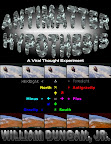The structure of spiral galaxies depends on the amount of resistance encountered by the surrounding antiparticle medium. Initially antiparticles occupy the territory outside the spiral arms. With minimal resistance near the black hole parent a barred spiral galaxy forms. The greater the resistance the jets encounter the faster its precession rate and the tighter the arms swirl into the pattern of twin spirals.
The volume of the jets depends on the mass of the black hole parent and hydrogen protoplasm birth rate. The pressure of the jets depends on the magnetic field strength and opposite gravity from the black hole and the focusing power of the accretion disk. Time is another factor. Dark matter antineutrinos are produced during neutron decay adding gravitation to the formation process of galaxies.
High velocity jets emanating from the central galactic black hole generate X-ray when hitting slower particles, indicating inside-out galaxy formation. Or the antiparticle medium gets sandwiched between spiral arms of galaxy M106, in which case the imagery exhibits the annihilation of matter and antimatter between the spiral arms that produce gamma rays, which are reduced in frequency through Compton scattering to X-rays. Either way is inconsistent with conventional cosmology.
| blue | x-rays |
| red | infrared |
| yellow | optical |
| violet | radio |
The Milky Way is a barred spiral galaxy with two major arms.
Core bulges of galaxies are hydrogen nurseries for new stars.
Far ultraviolet radiation occurring around Andromeda’s arms might be the result of annihilations or a nurturing intergalactic medium. Andromeda’s active core reveals young blue stars surrounded by older cooler red stars indicating an abundance of hydrogen produced by the black hole at the core of the galaxy.
Infant star clusters are found in the center of galaxy NGC 1512.
The oldest part of a galaxy disk is the rim where dust from the debris of supernovas is concentrated, and the first black holes of the next generation are born.
Jets form the bar of barred spiral galaxies seen in the visible spectrum image at right. The left image is the same area in ultraviolet. Arms produced by jets spread out from the center of spiral galaxies.
The precession direction of the jets reversed to produce back spinning spiral arms within the same galaxy. Try explaining that with outside-in galaxy formation. With the inside-out galaxy formation of cyclical cellular cosmology the black hole at the center of the galaxy got clobbered by an impact, which changed the precession direction of the jets that produce the spiral arms.
In Hoag’s Object the spiral arms propagated all the way to the edge of the galactic disk. Interrupted jets produce a ring galaxy.









No comments:
Post a Comment